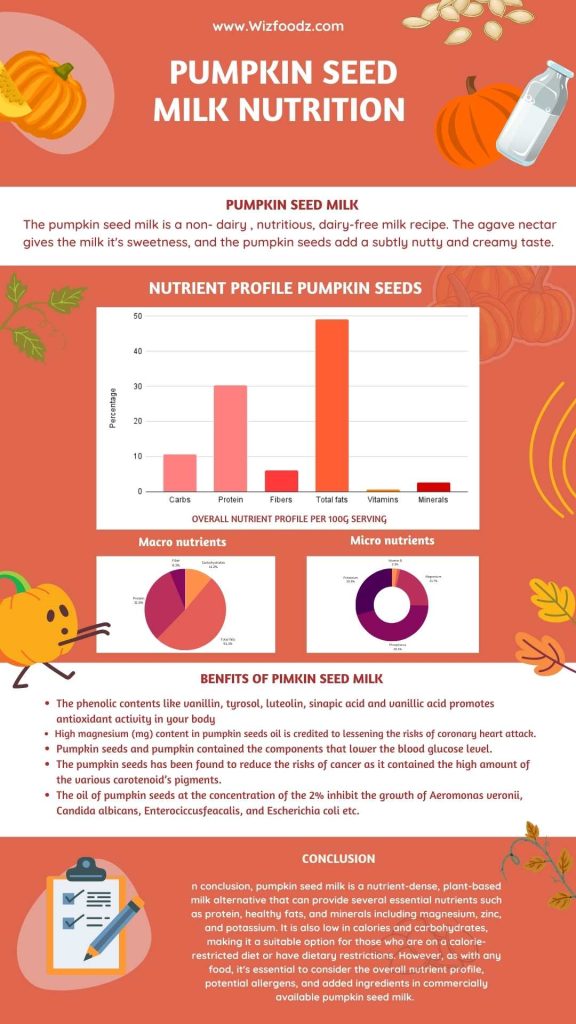Pumpkin seed milk may seem like just another alternative to fresh milk. It’s anything but. Sure, it tastes good. But it has some awesome health benefits as well! In this article, we’ll look at how to make this refreshing beverage, plus 10 health benefits of pumpkin seed milk you never knew.
Pumpkin seed milk nutrition
Pumpkin seed milk is made from, as their name suggests, pumpkin seeds. Despite their small size, pumpkin seeds pack a surprising nutritional punch (1). 100g serving of pumpkin seed milk contain,
- Energy 574 kcal
- Protein 29.84 g
- Total lipid (fat) 49.05 g
- Carbohydrate, by difference 14.71 g
- Fiber, total dietary 6.5 g
- Sugars, total 1.29 g
- Calcium 52 mg
- Iron 8.07 mg
- Magnesium 550 mg
- Phosphorus 1174 mg
- Potassium 788 mg
- Sodium 18 mg
- Zinc 7.64 mg
- Copper 1.275 mg
- Selenium 9.4 µg
- Vitamin C 1.8 mg
- Thiamin 0.07 mg
- Riboflavin 0.15 mg
- Niacin 4.43 mg
- Vitamin B-6 0.1 mg

Source : https://www.researchgate.net/publication/336797715_Nutritional_and_Therapeutic_Importance_of_the_Pumpkin_Seeds
Health benefits of pumpkin seed milk.

Pumpkin seeds can do wonders for your body. It positively affects your heart health, digestive health, and can even help you sleep better.
When you follow the pumpkin seed milk recipe at the bottom of this article, you won’t be straining out any of this goodness. You’ll get all the goodness of pumpkin seeds in pumpkin milk, too.
Here are 8 ways that drinking pumpkin seed milk can make you healthier.
1. Helps fight diabetes
Pumpkin seeds are high in dietary fiber. 100 grams can contain as much as 6.5 grams.
Dietary fiber can slow the rate at which your digestive system absorbs sugar, and also generally improve blood sugar levels (2). By eating the appropriate amounts of dietary fiber, you can reduce the risk of developing type 2 diabetes.
Aside from dietary fiber, pumpkin seeds also help with diabetes due to the presence of antioxidants.
Pumpkin seeds contain antioxidants like carotenoids and vitamin E (3, 4. 5). Food that contains antioxidants is immensely beneficial to your health.
When it comes to diabetes, antioxidants may reduce the risk of reactive oxygen (ROS) species developing in your body (6). ROS are a factor leading to type-2 diabetes (7). So by reducing the risk of ROS development, the antioxidants in pumpkin seeds can help curb diabetes.
2. Keeps your heart healthy
Pumpkin seed milk is high in magnesium, an essential mineral for heart health.
Magnesium plays more than 300 vital roles in your body. One of these is related to your muscles. Specifically, magnesium is what makes your body’s muscles relax. Calcium makes your muscles contract.
Your heart is also an organ made up of muscles. Calcium sends the signal for your heart’s muscle fibers to contract and push blood out of your heart. But the other half of a heartbeat depends on magnesium. It signals the heart’s muscle fibers to contract and draw blood into the heart. (8.)
Calcium buildup can damage your heart health (9). So, it’s important to get enough magnesium from your diet. The Recommended Dietary Allowance for men is 400-420 mg daily and for women, it is 310-320 mg daily (10).
Pumpkin seeds also contain good amounts of zinc, fatty acids, and antioxidants. All of these have been shown to be beneficial for heart health (11). Studies have shown that eating pumpkin-related foods can increase nitric oxide generation in your body. This is thought to be beneficial for heart health (12).
3 – Can help manage high blood pressure
Pumpkin seed milk contains potassium, which is a mineral known to be important in managing high blood pressure.
Many people suffer from high blood pressure due to the lack of potassium in modern diets. An appropriate level of potassium in the body helps to lower blood pressure (13).
Multiple studies have shown a link between low potassium intake and increased blood pressure and a higher risk of stroke (14, 15, 16). The converse is also true. A healthy amount of potassium in the diets of people with high blood pressure shows a significant lowering of their systolic blood pressure.
Some animal studies have shown that consuming the oil derived from pumpkin seeds may be beneficial for high blood pressure (17). Another study, conducted on postmenopausal women, showed that oil supplements derived from pumpkin seeds reduced diastolic blood pressure by 7% (18).
4 – May help with inflammation
Pumpkin milk may help with inflammation due to its high level of antioxidants.
Antioxidants, as their name might suggest, are compounds that inhibit oxidation. This is a chemical process that produces free radicals and chain reactions in your body. Both of these are harmful to your cells. (Free radicals are unusable atoms, by the way.)
Vitamin C, present in pumpkin seeds, is a powerful antioxidant. Its most famous function is to strengthen your body’s natural defenses (18). But it also helps against inflammation (19).
Studies have shown that eating food with vitamin C can increase your blood antioxidant levels by as much as 30% (20).
Interestingly, the antioxidants present in pumpkin seed milk don’t really have any side effects. One animal study, conducted on rats with arthritis, showed that rats given pumpkin seed oil had reduced inflammation and no side effects. But rats who were given an anti-inflammatory drug did experience side effects (21). So, if you need to control inflammation, you might want to try experiencing the amazing health benefits of pumpkin seed milk.
5 – Keeps your bones healthy
Earlier, we talked about magnesium and its manifold benefits. Apart from heart health, it is also necessary to keep your bones healthy.
People who eat food with high amounts of magnesium have a higher bone density (22). Also known as bone mineral density, this is the amount of bone mineral in your bone tissue. Having high bone density means you’re less likely to get a fracture or osteoporosis.
Postmenopausal women are especially susceptible to osteoporosis (23). This is why food rich in magnesium is recommended for women post-menopause. Getting more magnesium from foods or dietary supplements might help older women improve their bone mineral density.

6 – Helps strengthen your body’s defenses
Pumpkin seed milk is high in vitamin E and antioxidants, which may provide a boost for your immune system and its functions.
Vitamin E is found in higher amounts in your white blood cells than in other cells. Want to improve the performance of your immune system? Add some vitamin C to your diet.
Vitamin E modulates the function of T cells by directly impacting T cell membrane integrity, signal transduction, and cell division (24). (T cells are an essential part of your immune system.)
Having the appropriate amount of vitamin E in your body has many benefits. You would be less likely to come down with respiratory diseases and allergic reactions like asthma (25).
However, too much vitamin can be bad for you. Since it is a fat-soluble vitamin, it can be stored in your body. Excess consumption can lead to toxicity. Symptoms of vitamin E excess include bleeding, muscle weakness, fatigue, nausea, and diarrhea (26).
7 – Promotes sexual health
Multiple studies have shown that eating pumpkin seeds can reduce symptoms associated with benign prostatic hyperplasia (BPH) (27).
BPH is a condition in men which causes the prostate gland to enlarge and makes it difficult to urinate. Although an exact cause for this condition is as yet unknown, it is thought to be brought on by changes in male sex hormones. This may happen naturally.
One massive study conducted on over 1,400 men with BPH also showed the benefits of pumpkin seed oil (28). Consuming food enriched with the oil led to reduced symptoms and an overall improvement of the quality of life of the men.
Another similar six-month study concluded similar results. Consuming 320 milligrams a day of pumpkin seed oil over six months may be sufficient to experience these results (29).
Earlier in this article, we talked about how pumpkin seeds contain zinc. Zinc has been linked with testosterone levels. I.e. young men with a zinc deficiency have been shown to have significantly lower levels of testosterone (30). The testosterone hormone improves libido in men.
Pumpkin seeds have also been used as a traditional aphrodisiac. An animal study (31) fed a pumpkin seed extract to rats, combined with zinc. The study concluded that may have a beneficial effect on sexual health status.
8 – May promote health during pregnancy
Zinc is also one of the most important minerals a woman’s body needs during pregnancy.
This mineral found in pumpkin seed milk is required for the construction of a baby’s cells and DNA during pregnancy. Zinc plays a role in cell division and tissue growth, among, other normal developmental functions (32).
Aside from the growth of the baby, eating pumpkin seeds can benefit the mother as well. Low zinc levels may lead to less-than-ideal levels of hormones related to labor. The female body also needs zinc to prevent uterine infections (33).
9 – keeps your skin and eyes healthy
Pumpkin seeds have a seemingly endless array of healthful compounds. One of these is an antioxidant known as squalene.
Squalene, of which pumpkin seeds are a good source, has many benefits (34). On one hand, this antioxidant may be useful in protecting your skin against UV and other types of solar radiation. Exposure to UV rays is known to cause premature aging of the skin.
On the other hand, animal studies indicate that squalene may be important in keeping your retinas healthy.
Squalene is similar to beta carotene. Some studies show that beta carotene might slow mental decline (35).
10 – Helps you sleep better
Finally, we have a rather surprising benefit of pumpkin seed milk. Can’t seem to catch a wink? Try popping some pumpkin seeds before going to bed.
Pumpkin seeds are a natural source of an amino acid known as tryptophan, which is known to promote sleep (36).
But you’ll need to eat about 200 grams of pumpkin seeds before you hit the needed amount of tryptophan. However, a study has shown that consuming seed-based tryptophan along with a carbohydrate is as effective as a clinical dose of tryptophan (37).
Pumpkin seed milk contains two other minerals known to promote better sleep: zinc and magnesium.
The zinc in pumpkin seeds helps convert tryptophan to serotonin to melatonin, which is the hormone regulating your sleep cycles. Magnesium has also been linked to better sleep (38).
So try a few of these seeds before bed. Who knows? You might even dream about the health benefits of pumpkin seed milk!
How to make pumpkin seed milk at home
Making pumpkin seed milk is no big deal. You can easily make it at home with following simple steps.
Pumpkin seed milk recipe

This recipe is as simple as they come. To experience the health benefits of pumpkin seed milk, just follow these simple instructions:
Ingredients
- 1 cup raw pumpkin seeds
- Water for soaking
- 1 tsp unrefined salt
- 4 cups water
- 1 date (or 1 tbsp maple syrup)
Preparation instructions
- Soak pumpkin seeds in water and salt overnight, or at least 6 hours.
- Drain and rinse soaked seeds and place them into the blender with 4 cups of water and date/maple syrup. Add optional add-ins, if desired.
- A process on HIGH for about a minute or so, until creamy and smooth. Strain through a nut milk bag (squeezing out as much as you can.)
- Store in an air-tight glass jar for up to 3 days in the fridge.
This delicious recipe courtesy of Savory Lotus. Check them out for more!
Frequently Asked Questions
What does pumpkin seed milk taste like?
Pumpkin seed milk has a mild nutty flavor and a subtle sweet flavor . It has a creamy texture and a slightly grainy consistency due to the presence of pumpkin seed pulp. The flavor can vary depending on the specific recipe and any additional flavorings that you use.
Since pumpkin seed milk does have a distinctive flavor you can try to sweeten it by adding vanilla extract and brighten the flavor. This milk is delicious when mixed with carrot juice and cinnamon (a small pinch)
What are the disadvantages of eating pumpkin seeds?
Although pumpkin seeds have many nutritional benefits, there are some potential disadvantages of eating them as well. which include,
- Not a good option for people who take Diuretic Drugs – Research studies indicate that pumpkin seeds contain natural, mild diuretic properties that may interact with diuretic medications, leading to an increased need for urination. This could potentially impact the mineral balance in your body.
- May cause stomach ache – This is because pumpkin seeds are rich in fatty oils, and excessive consumption beyond recommended levels could lead to stomach discomfort, cramps, and pain. To avoid this side effect, it is better to consume only 1-2 teaspoons at a time or to pair them with other foods. Roasting the seeds before consuming them may also help alleviate this issue.
- May cause allergic reactions – Although pumpkin seeds are generally considered to be low on the allergenic properties, they can still trigger certain allergic reactions, particularly affecting the skin. If you happen to have an allergic reaction to pumpkin seeds, your body may show some symptoms like Eczema (scaly and red skin) itching and hives, sneezing and allergic asthma etc.
- Not a good option for hypoglycemic people – scientific research regarding the nutritional effects of pumpkin seeds suggest that consuming pumpkin seeds may help reduce the risk of a sudden spike in glucose levels. If you are an hypoglycemic person, it is better to consult with your doctor before including pumpkin seeds in your diet.
- Not good for hypotensive people – Due to their high antioxidant content, pumpkin seeds have the potential to lower blood pressure levels. If you have hypotension, or if you are hypertensive and taking anti-hypertensive medications, it is recommended to consult with your doctor before consuming pumpkin seeds to discuss any associated complications and risks.
Pumpkin seeds benefits for women
Nutritionists suggest that pumpkin seeds are not only convenient to incorporate into your diet, but they can potentially aid your hormonal balance, while stabilizing your blood sugar and improving insulin sensitivity. If you more interested in benefits of pumpkin seeds for female body, check the list below.
- May aid in reducing hair loss
- Reduce menstrual pain
- Rich in essential fatty acids
- Has the potential to lower cholesterol levels
- A good natural source of magnesium
- May help decrease the risk of osteoporosis in postmenopausal women
Pumpkin seeds benefits for men
- Improve your prostate and bladder health
As we discussed in chapters above, research studies suggest that pumpkin seeds maybe beneficial in alleviating symptoms of benign prostatic hyperplasia (BPH). This is a condition will lead to difficulties with urination in males. In addition, further research suggests that you can use pumpkin seeds/derivatives as supplements to treat symptoms associated with an overactive bladder.
- May have effects in facilitating sperm quality
Low levels of zinc may result in increasing the risk of infertility and poor sperm quality in men. Pumpkin seeds are rich in zinc and can help enhance sperm quality. A study conducted on animals revealed that by supplementing with vitamin E and pumpkin seed oil it is possible to improve reproductive performance and sperm quality.
How much pumpkin seeds to eat daily?
According to American Heart Association, the daily intake of pumpkin seeds is approximately a quarter cup (30 grams) as a part of a healthy diet. This serving size of pumpkin seeds provides an abundant source of essential nutrients such as healthy fats, magnesium, zinc, and fiber etc. However, keep in mind that consuming large amounts of pumpkin seeds may lead to adverse effects, such as mineral imbalances and gastrointestinal discomfort.
Are pumpkin seeds good for dogs?
The simple answer is yes. You can easily roast or toast pumpkin seeds and give it as a snack to your dog. It would be an excellent healthy option for your pet and you as well. Or else you could grind pumpkin seeds and add the powder to your dog’s regular diet. Either way, pumpkin seeds are healthy for your pet.
How long are pumpkin seeds good for?
To ensure that pumpkin seeds last for an extended period after opening, it is better to store them in a tightly sealed airtight container or heavy-duty plastic bag. At normal room temperature, they can last for approximately three months with proper storage conditions.
However, for a longer shelf life, it is advisable to keep pumpkin seeds in the refrigerator, where they can remain fresh for around an year. You can freeze them in airtight containers or heavy-duty freezer bags to further extend their shelf life. With proper storage, pumpkin seeds will maintain their best quality for about 12 months, although they will remain safe to consume beyond that time.
Are pumpkin seeds keto?
Yes, pumpkin seeds can be included in a keto diet as they are low in carbohydrates and high in healthy fats, protein, and fiber. In fact, pumpkin seeds are often recommended for those following a keto diet because they are a good source of essential nutrients like magnesium, zinc, and omega-3 fatty acids.
However, as with any food, it’s important to pay attention to portion sizes and to factor in the carbohydrates from other sources in your overall diet to ensure you stay within your daily carb limit.
Final thoughts
Pumpkin seed milk is a great way to add a whole variety of nutrients to your diet. You’ll love the amazing ways it benefits your health. The great taste is a bonus.
What’s your favorite fresh milk alternative? Let us know in the comments!





